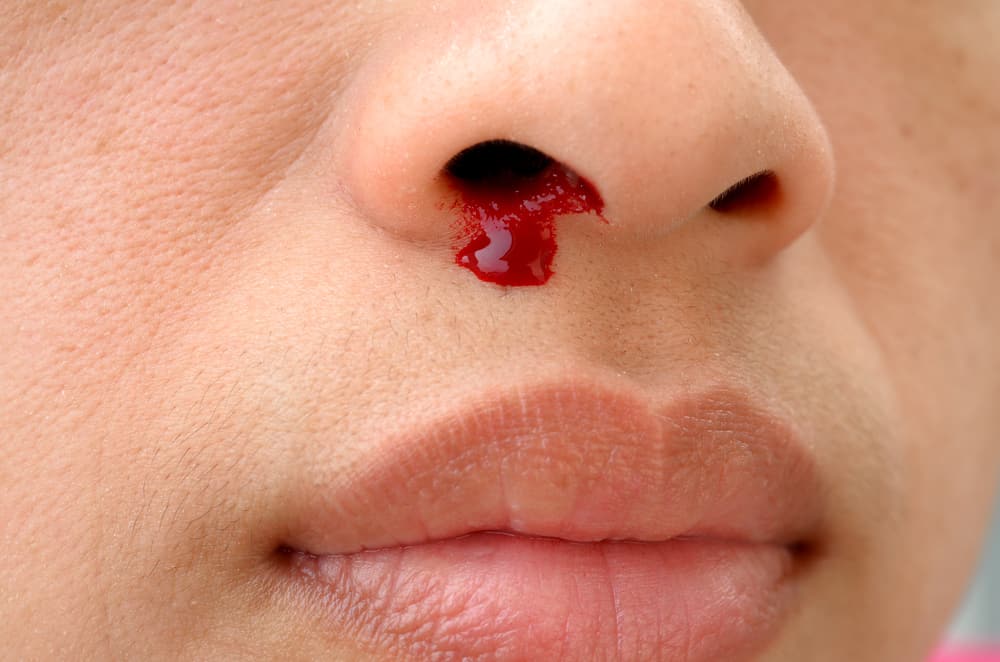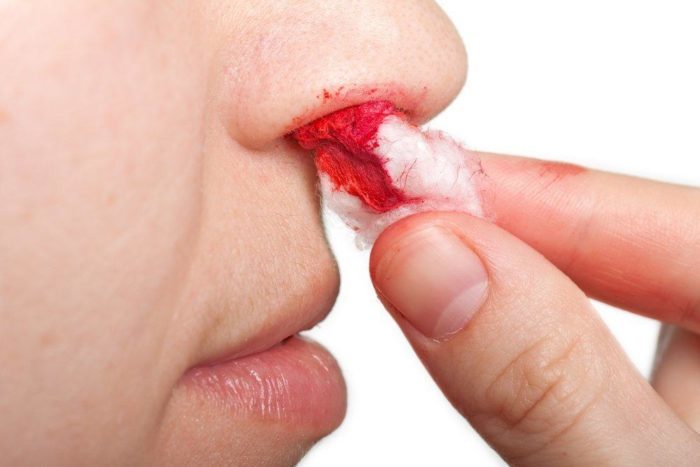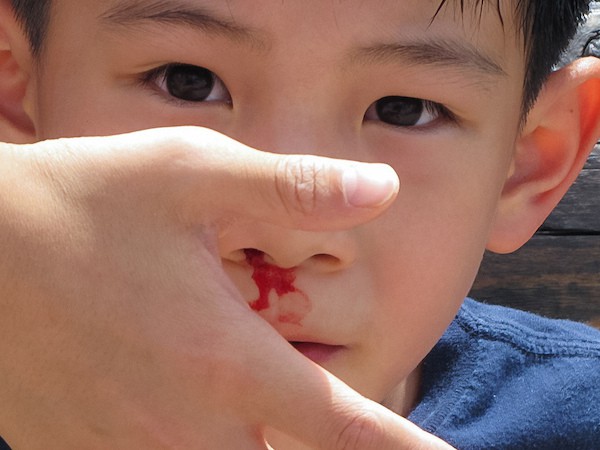Contents:
- Medical Video: What Causes Nosebleeds
- What is a nosebleed?
- What are the causes of nosebleeds?
- Causes of nosebleeds by type
- Common causes of nosebleeds
- Causes of nosebleeds
- Causes of nosebleeds in pregnant women
- The cause of nosebleeds can also be a symptom of certain cancers
- 1. Nasopharyngeal carcinoma
- 2. Leukemia
- 3. Lymphoma
- What should be done during a nosebleed?
- Sit up straight and point your body forward
- Don't sneeze
- Press the nostrils for 10 minutes
- Cold compress
- If the nosebleed hasn't stopped, go to the doctor immediately
Medical Video: What Causes Nosebleeds
Have you ever had a nosebleed? Maybe almost everyone has had a nosebleed at least once in their lifetime. When you have a nosebleed or someone else around you has a nosebleed, you might think this nosebleed is caused by heat. More than that, it turns out that nosebleeds can be caused by many things, from mild to serious conditions. In addition, nosebleeds can also occur to anyone, from children, adults, even pregnant women. The article below will review various causes of nosebleeds in children to adults.
What is a nosebleed?
When there is blood coming out of your nose, you usually call it nosebleeds or epistaxis. However, what exactly is a nosebleed? Nosebleeds are bleeding from the inside of the nose. Nosebleeds can occur at any age, ranging from children to adults. When someone has a nosebleed, you might see it as a scary and dangerous thing, but generally nosebleeds are a small nuisance.
Nosebleeds can be divided into two types based on where the bleeding originates, namely anterior and posterior.
- Anterior nosebleeds usually comes from bleeding that occurs in the blood vessels of the part front of the nose. Usually this nosebleed is easier to control and most common.
- Posterior nosebleeds is a nosebleed that occurs due to bleeding in a part blood vessel back of the nose. These nosebleeds are usually associated with high blood pressure and require special treatment. Usually posterior nosebleeds are more common in the elderly.
What are the causes of nosebleeds?
Nosebleeds can be caused by a variety of things, from the small to the things related to your health condition. The lining of your nose consists of many small blood vessels that are easily broken, making it very easy for nose bleeding or nosebleeds to occur. The following are various causes of nosebleeds.
Causes of nosebleeds by type
Based on the type of nosebleed, the causes of frequent nosebleeds can be different.
Anterior nosebleeds
Mostly, frequent causes of nosebleeds can be included in the anterior nosebleed group. This type of nosebleed is usually more common in young children (around the age of 2-10 years) and is usually not a sign of serious things.
The causes of anterior nosebleeds usually include:
- Picking too deep or with sharp nails
- Removing snot is very hard or rough
- Nasal congestion, usually caused by infection (such as colds and flu)
- Sinusitis
- Fever or allergy
- The air is dry, causing the nasal membrane to dry out. The inside of a dry nose becomes more susceptible to bleeding and infection.
- Being in the highlands
- Excessive use of nasal decongestants
- Minor nose injury
- The shape of the nose is bent, this can occur from birth or because of an injury to the nose
Posterior nosebleeds
This type of nosebleed is less common, but is usually more common in adults. Posterior nosebleeds also usually occur more so that it requires serious treatment.
The causes of posterior nosebleeds are usually:
- Trauma to the nose, which can be caused by a blow to the head or a fall, or a broken nose
- Nose surgery
- Tumors in the nasal cavity
- Atherosclerosis
- Medications that cause you to experience bleeding more easily, such as aspirin and anticoagulants (such as warfarin and heparin)
- Blood clotting disorders, such as in hemophilia or von Willebrand's disease
- Hereditary haemorrhagic telangiectasia (HHT), a hereditary genetic condition that affects blood vessels
- Leukemia
- High blood pressure
Common causes of nosebleeds
In general, the causes of frequent nosebleeds can vary from one person to another. The cause is often nosebleeds can be from small things or is a sign of a particular disease.
The following are various causes of frequent nosebleeds, including:
Dry air
The most common cause of nosebleeds is due to dry air. Usually this condition will be more common in cold climates when many upper respiratory tract infections occur and when the temperature and humidity rise and fall dramatically.
In addition, changes in temperature from the cold outside environment into a warm and dry home will make the nose more susceptible to bleeding.
However, not only in cold climates, nosebleeds can occur in hot and dry climates with low humidity or seasonal changes. This climate can cause the nasal lining to dry until it cracks and bleeds.
Use of blood thinning drugs
Various blood thinning drugs, such as aspirin, Coumadin or Jantoven (warfarin), the Plavix anti-platelet drug (clopidogrel bisulfate), and nonsteroidal anti-inflammatory drugs can actually be a frequent cause of nosebleeds.
Blood thinning drugs will change the ability of the blood to clot and also freeze. As a result, bleeding in the nose cannot be avoided and is difficult to stop, so there is a nosebleed. This drug is usually used for disease conditions at the risk of blood clots such as heart conditions, namely atrial fibrillation.
Having a nose injury
An accidental injury to the nose can also damage the blood vessels in the nostrils and eventually bleed. The cause of this one nosebleed often occurs in children when scratching and scraping their noses.
However, this can also be a cause of nosebleeds in adults. The habit of scratching an itchy nose can also make the nose of an adult injured. So that the nose will unwittingly bleed.
Certain health problems
The most feared cause of nosebleeds is due to certain health problems. If you experience nosebleeds without realizing the cause, this may be a symptom or sign of kidney disease, liver, excessive alcohol consumption, to other health problems that can reduce the body's ability to freeze blood.
Health problems that commonly cause nosebleeds are hypertension and congestive heart failure. Even colds and allergies can also be a frequent cause of nosebleeds due to irritated nasal lining.
Causes of nosebleeds
Actually the cause of nosebleeds is almost the same as the cause of nosebleeds in adults. Common causes of nosebleeds in adults are those mentioned above. However, in children there are several things that can be the cause of nosebleeds. The following are some of the causes of nosebleeds in children, namely:
Frequently scrape the nostrils
Toddlers or children have a high curiosity about objects around them. This makes them often explore something around it, even in extreme ways. One example is to insert a blunt object into the nostrils that eventually makes the child nosebleed. The habit of often digging nostrils especially too strong is often the main cause of nosebleeds in children and toddlers.
The child's nose is hit or hit by a hard object
Blood vessels in the area of the child's nose are still weak, so they have the potential to experience nosebleeds when there is a hard impact or is hit hard enough.
Actually this not only makes children nosebleed, but also can be a cause of nosebleeds in adults. Although, blood vessels in the nose of an adult can be said to be strong or normal.
When hit or hit a hard object, the blood vessels in the nose break and eventually the blood comes out through the nostrils. If this happens to your child, you should as a mother oversee your child when playing so that they remain safe and avoid the risk of collisions or blows of hard objects.
Fatigue
Nosebleeds that occur due to fatigue are actually due to relatively weak blood vessels. When your baby experiences fatigue, this weak blood vessel is easily tense and finally breaks. As a result, nosebleeds cannot be avoided. Be careful with the causes of children often this one nosebleed.
Causes of nosebleeds in pregnant women
Nosebleeds tend to occur more often during pregnancy. You don't need to panic and worry, because mild intensity with occasional intensity during pregnancy is generally not harmful to the condition of the mother and fetus.
Here are some of the causes of nosebleeds during pregnancy:
Hormonal changes
Hormonal changes are usually the most common cause of nosebleeds in pregnant women. Often a sudden nosebleed during pregnancy is usually not an excessive worry.
High levels of hormones during pregnancy can increase blood flow of estrogen and progesterone in all mucous membranes in the body of pregnant women, including the nose.
This membrane will then swell and widen to suppress the blood vessels in it. As a result, blood vessels can rupture and make the nose bleed during pregnancy.
Pregnancy phase
The pregnancy phase can cause the blood vessels in the nose to widen, and increase the blood supply to the nose of pregnant women, causing the blood vessels around the nose to break easily.
Allergy and sinus
The cause of nosebleeds in pregnant women can also be caused by having an allergy to cold, sinuses, or when the membranes inside your nose are dry. Trauma and certain medical conditions, such as high blood pressure or clotting disorders in the bloodstream, can also be a cause of nosebleeds in pregnant women.
The cause of nosebleeds can also be a symptom of certain cancers
Although, most nosebleeds will stop by themselves without serious medical treatment. but, often experiencing nosebleeds can also be a sign of a serious illness, such as cancer.
The cause of nosebleeds can be a symptom of some cancers. Here are three types of cancer that are often the cause of nosebleeds.
1. Nasopharyngeal carcinoma
Nasopharyngeal carcinoma is a cancer that occurs in the nasopharynx, located in the upper part of the pharynx (throat), behind the nose. Squamous cell carcinoma (SCC) is the most common type of cancer in this area. SCC arises from the lining of the nose.
Repeated nosebleeds are a common symptom of nasopharyngeal carcinoma. This cancer not only causes nosebleeds, but also causes the runny nose to always contain blood spots.
Nosebleeds due to nasopharyngeal carcinoma occur on one side of the nose and usually do not cause heavy bleeding. It is difficult to detect nasopharyngeal carcinoma at an early stage. This is because the nasopharynx is not easily recognized and the symptoms are similar to other common conditions. This cancer can spread to other parts through the tissue, lymph system, and blood flow and to parts of the bones, lungs, and liver (liver).
2. Leukemia
The cause of frequent nosebleeds can also be a symptom of leukemia. People with leukemia often experience bruising and also bleed easily. Leukemia is a cancer of the white blood cell, which blocks white blood from fighting infection. When a person has leukemia, his bone marrow is unable to produce enough red blood cells and platelets to supply the body's needs.
Leukemia can be divided intoacute myeloblastic leukemia (AML),chronic myelocytic leukemia (CML),acute lymphoblastic leukemia (ALL) and chronic lymphocytic leukemia(CLL). Chronic leukemia is far more dangerous and difficult to treat. This is the most common type of blood cancer.
Nosebleeds due to leukemia may be difficult to stop, even though the bleeding that occurs is usually not so severe. In addition to nosebleeds and easy bruising or bleeding, other possible symptoms of leukemia include fever, night sweats, bone pain, feeling weak, swollen lymph nodes, and weight loss without a clear cause.
3. Lymphoma
Lymphoma develops in lymphocytes (a type of white blood cell) that fight infection. Abnormal lymphocytes can interfere with your immune system. This will reduce resistance to dangerous factors from the outside. Hodgkin lymphoma and non-hodgkin lymphoma (NHL) are the two main types of lymphoma.
Because lymph nodes and other lymphatic tissues occur throughout the body, lymphoma can appear in almost all parts of the body, including the nose or sinuses (the nasal cavity that contains air behind the facial bones). Growth of lymphoid tissue in the nose or sinuses can erode the inside of blood vessels and cause nosebleeds.
What should be done during a nosebleed?
If you or a child has a nosebleed, the key is to stay calm and not panic. You can do the following to overcome nosebleeds.
Sit up straight and point your body forward
Most people when they have a nosebleed, they lie down or raise their heads back. This is a wrong position and is not recommended.
The correct way is to make sure your position remains upright and aim your body slightly forward. This can prevent blood returning to the nose or airway. If you lie down, the blood will re-enter and can block the airway.
Don't sneeze
When blood is still flowing, do not intentionally try to sneeze or bleed from the nose. It can actually make nosebleeds difficult to stop and stimulate blood that begins to dry up to re-flow again.
Press the nostrils for 10 minutes
To deal with nosebleeds, push your nostrils using your fingers (thumb and index finger) for 10 minutes. The action aims to give emphasis to the bleeding point so that the blood stops flowing. When you do this, you can try to breathe by mouth first.
Cold compress
You can also put cold compresses on your nose so the blood stops faster. However, do not directly attach ice cubes to the nose. Wrap ice cubes with a soft cloth or towel, just stick to the nose to overcome the nosebleed.
If the nosebleed hasn't stopped, go to the doctor immediately
If blood continues to flow for more than 20 minutes and the action you have taken has not produced results, you should immediately see a doctor for further medical treatment. In addition, if you have difficulty breathing, losing a lot of blood due to nosebleeds, swallowing lots of blood to vomiting, and nosebleeds caused by serious accidents, you should also go to the doctor for further examination and treatment.


















